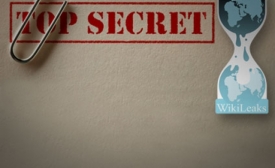wikileaks
America’s ambassador to the Holy See says the two sides are working to rebuild trust following the leak of embarrassing diplomatic cables late last year.
Since the WikiLeaks scandal exploded at the end of last year, many commentators have declared this episode marks "the end of diplomacy." Nonsense.
The damage caused by the WikiLeaks controversy has caused little real and lasting damage to American diplomacy, senior state department officials have concluded. It emerged in private briefings to Congress by top diplomats that the fallout from the release of thousands of private diplomatic cables from all over the globe has not been especially bad.
A swath of cables released by WikiLeaks show that Iceland looked to fellow pro-whaling nation Japan to bolster its case to ease the international ban on whale hunting. But Japan was hard-pressed to help.
Is it possible that Iran's blustering president Mahmoud Ahmadinejad, long thought to be a leading force behind some of Iran's most hard-line and repressive policies, is actually a reformer whose attempts to liberalize, secularize, and even "Persianize" Iran have been repeatedly stymied by the country's more conservative factions?
Last month, there were several released documents from WikiLeaks, which showed Singapore Minister Mentor, Lee Kuan Yew and other Singapore diplomats giving unflattering remarks on countries including Myanmar, North Korea, Malaysia and India.

Wikileaks may be a shock to the system, but it also might bring certain public diplomacy benefits.
Singapore diplomats would be more cautious in discussions with their US counterparts following the publication of confidential cables by WikiLeaks, the city-state's foreign minister said Monday, calling the release of the documents a disaster for the US.







